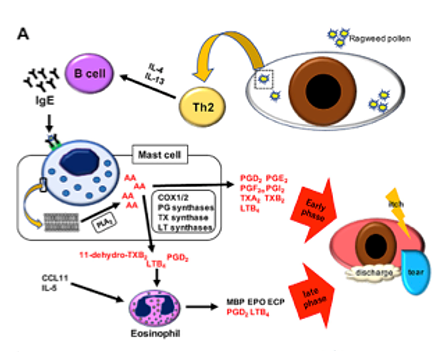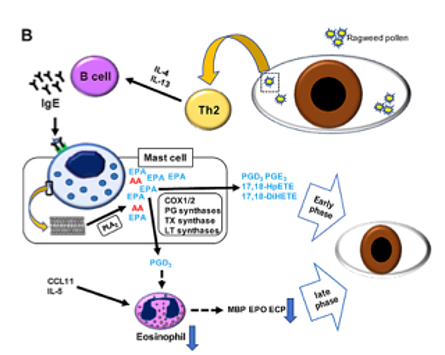Dec. 04, Tue, 2018
Topics
>RESEARCH
Omega-3 fatty acids suppress allergic conjunctivitis symptoms
(Tokyo,4 December) Researchers at Juntendo University report in the FASEB Journal that a diet based on omega-3 fatty acids alleviates allergic conjunctivitis in mice. Their findings may lead to alternative treatments for the disease not based on
traditional mast cell stabilizer and antihistamine eye drops.

 Suppression mechanism of allergic conjunctivitis by an omega-3 fatty-acid diet in mice exposed to ragweed pollen. Mice on a diet A) without and B) with omega-3 fatty acids.
Suppression mechanism of allergic conjunctivitis by an omega-3 fatty-acid diet in mice exposed to ragweed pollen. Mice on a diet A) without and B) with omega-3 fatty acids.
Allergic conjunctivitis (AC) is a common eye disease, with symptoms including itch, redness of the conjunctiva (the membrane at the surface of the eye and eyelids) and discharge. The condition is usually treated by eye drops that often contain mast cell stabilizer and antihistamine, countering the action of histamine released in association with AC. Now, a team of researchers from Juntendo University led by Takehiko Yokomizo has shown that in mice, a diet rich in omega-3 fatty acids alleviates AC symptoms in the early and late phases of the disease. The scientists found that the omega-3 fatty acids reduce the amounts of certain inflammatory lipid mediators present in the conjunctiva and known to be involved in the pathogenesis of AC.
In the experiments of Yokomizo and colleagues, one group of mice was given food containing linseed oil, rich in an omega-3 fatty acid, while another group was kept on a diet based on soy oil, rich in an omega-6 fatty acid. After one month into the diet, the mice were sensitized with ragweed pollen through injection, and AC was induced by eyedrop containing ragweed pollen.
The level of AC symptoms in the mice’s eyes was summarized by a ‘clinical score’, factoring in swelling, redness and discharge. In addition, after the final application of pollen, scratching behavior was monitored ? the mice were recorded on video. Eyeballs and blood were analyzed as well. The researchers observed that the omega-3 fatty-acid diet improved the allergic symptoms, including an almost complete suppression of scratching.
In order to gain insights into why omega-3 fatty acids alleviate AC symptoms, Yokomizo and colleagues analyzed which compounds are present in the conjunctiva. Specifically, they checked lipid mediators, and found that the amounts of particular inflammatory mediators were reduced.
The researchers also checked whether the diet affects the normal immune responses, known as Th2 responses, which trigger the release of histamine, and known to cause asthma and food allergies. By comparing the two groups of mice, they concluded that the Th2 response was comparable for both groups, and therefore not modulated by omega-3 fatty acids.
The Juntendo University scientists conclude that “altering the lipid mediator profile with dietary omega-3 fatty acids may be a safe and practical approach for the prevention and therapeutics of AC, especially given that omega-3 fatty acid consumption is currently declining worldwide”.
DOI: 10.1096/fj.201801805R
https://www.fasebj.org/doi/abs/10.1096/fj.201801805R
Correspondence to:
tyokomi@juntendo.ac.jp


Allergic conjunctivitis (AC) is a common eye disease, with symptoms including itch, redness of the conjunctiva (the membrane at the surface of the eye and eyelids) and discharge. The condition is usually treated by eye drops that often contain mast cell stabilizer and antihistamine, countering the action of histamine released in association with AC. Now, a team of researchers from Juntendo University led by Takehiko Yokomizo has shown that in mice, a diet rich in omega-3 fatty acids alleviates AC symptoms in the early and late phases of the disease. The scientists found that the omega-3 fatty acids reduce the amounts of certain inflammatory lipid mediators present in the conjunctiva and known to be involved in the pathogenesis of AC.
In the experiments of Yokomizo and colleagues, one group of mice was given food containing linseed oil, rich in an omega-3 fatty acid, while another group was kept on a diet based on soy oil, rich in an omega-6 fatty acid. After one month into the diet, the mice were sensitized with ragweed pollen through injection, and AC was induced by eyedrop containing ragweed pollen.
The level of AC symptoms in the mice’s eyes was summarized by a ‘clinical score’, factoring in swelling, redness and discharge. In addition, after the final application of pollen, scratching behavior was monitored ? the mice were recorded on video. Eyeballs and blood were analyzed as well. The researchers observed that the omega-3 fatty-acid diet improved the allergic symptoms, including an almost complete suppression of scratching.
In order to gain insights into why omega-3 fatty acids alleviate AC symptoms, Yokomizo and colleagues analyzed which compounds are present in the conjunctiva. Specifically, they checked lipid mediators, and found that the amounts of particular inflammatory mediators were reduced.
The researchers also checked whether the diet affects the normal immune responses, known as Th2 responses, which trigger the release of histamine, and known to cause asthma and food allergies. By comparing the two groups of mice, they concluded that the Th2 response was comparable for both groups, and therefore not modulated by omega-3 fatty acids.
The Juntendo University scientists conclude that “altering the lipid mediator profile with dietary omega-3 fatty acids may be a safe and practical approach for the prevention and therapeutics of AC, especially given that omega-3 fatty acid consumption is currently declining worldwide”.
Researcher video (146 seconds)Toshiaki Hirakata, graduate student,Department of Ophthalmology, Juntendo University Faculty of Medicine.
Researcher video (253 seconds)Takehiko Yokomizo, Professor, Department of Biochemistry
Background
Allergic conjunctivitis
Allergic conjunctivitis (AC) is an eye inflammation caused by allergic reactions to pollen, mold spores or other substances. Eyes then become red, itchy, and watery. What happens is that the conjunctiva, the membrane covering the eyeball and the eyelids’ insides, becomes irritated (swollen) from allergens. These symptoms result from the release of histamine and other substances, stimulating widening of blood vessels, irritation of nerve endings and increased production of tears. AC is quite common; 30?40% of the general population is affected by it. Traditional treatment of AC is mainly by administering mast cell stabilizers and antihistamines, but Takehiko Yokomizo and colleagues from Juntendo University have now discovered that a diet of omega-3 fatty acids alleviates AC in a mouse model, without modulating the normal immune responses.Omega-3 and omega-6 fatty acids
Omega-3 and omega-6 fatty acids are organic molecules belonging to the category of polyunsaturated fatty acids. The term ‘unsaturated’ refers to double carbon bonds. In the case of omega-3 fatty acids, there is a (first) double bond between the third and the fourth carbon atom from the ‘tail’ end, in the case of omega-6 between the sixth and the seventh carbon atom from the tail.Omega-3 and omega-6 fatty acids are commonly found in nutrients. Oily fish are a common source of omega-3, whereas omega-6 is present in food oils and nuts. The Western diet has evolved in such a way that many individuals now have an intake with a ratio of omega-6 to omega-3 of more than 10, whereas a ratio of 4 or lower is believed to be optimal.The findings of Yokomizo and colleagues suggest that a diet rich in omega-3 fatty acids may alleviate the symptoms of allergic conjunctivitis in humans.ReferenceT
oshiaki Hirakata, Hyeon-Cheol Lee, Mai Ohba, Kazuko Saeki, Toshiaki Okuno, Akira Murakami, Akira Matsuda & Takehiko Yokomizo. Dietary omega-3 fatty acids alter the lipid mediator profile and alleviate allergic conjunctivitis without modulating Th2 immune responses. FASEB Journal, November 2018.DOI: 10.1096/fj.201801805R
https://www.fasebj.org/doi/abs/10.1096/fj.201801805R
Correspondence to:
tyokomi@juntendo.ac.jp